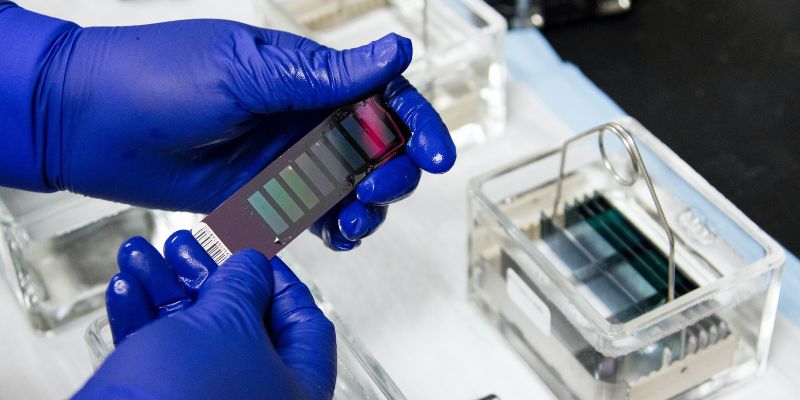Pregnancy is a transformative journey that begins even before one realizes they're pregnant. The human body is astoundingly accurate, with several subtle (and some not-so-subtle) changes hinting at the commencement of this profound life event.
The Science Behind Pregnancy Detection
Hormonal changes occur after sperm fertilize eggs. The hCG hormone release is the most significant change. This hormone sustains the corpus luteum, a transitory endocrine structure involved in ovulation and early pregnancy. The corpus luteum generates progesterone early in pregnancy to nourish the embryo.
Why hCG is Important
hCG is called the "pregnancy hormone" because most pregnancy tests detect it. In early pregnancy, this hormone doubles every 2-3 days and peaks around the 8th to 11th week. Following its peak, hCG levels drop and remain stable throughout the pregnancy.
Spotting and Cramping in Early Pregnancy
One of the early signs of pregnancy is implantation bleeding. This phenomenon occurs when the embryo attaches itself to the uterus wall. This attachment can result in minor spotting, distinguishable from regular menstruation due to its lighter shade and shorter duration.
Implantation Bleeding vs. Menstrual Period
Many women mistake implantation bleeding for menstruation due to its appearance and feel. However, there are significant differences:
- Duration: Implantation bleeding lasts a day or two, while menstruation lasts 4-7 days.
- Color: The spotting from implantation tends to be lighter, ranging from pale pink to brown, while menstrual blood is usually brighter red.
- Cramping: The cramps experienced during this stage of early pregnancy can be milder than menstrual cramps. However, they can be similar, leading to further confusion.
Why Implantation Bleeding Occurs
The exact cause of implantation bleeding remains unclear. However, it's believed that as the embryo attaches itself to the blood-rich lining of the uterus, small blood vessels might be ruptured, leading to spotting.
Changes in Breast Sensitivity
Breast changes, particularly in their sensitivity, are among the most prominent signs of early pregnancy for many women. Following conception, the body undergoes rapid hormonal shifts, notably in estrogen and progesterone. These shifts can make the breasts tender, sore, or even tingly.
Understanding Breast Changes During Pregnancy
As the signs of pregnancy become more evident, women might notice several changes in their breasts, including:
- Size: The breasts often become fuller and slightly larger. This change is in preparation for breastfeeding.
- Areola Darkening: The area around the nipples, known as the areola, might darken in color and increase in diameter.
- Veins: Increased blood supply might make the breasts' veins more visible.
- Bumps on the Areola: The small glands around the areola often become more pronounced.
Reasons for These Changes
The body prepares itself for breastfeeding right from the initial stages of pregnancy. These breast changes are a response to the body's preparation for this crucial role, ensuring that the newborn will receive the necessary nutrition after birth.
Fatigue During Pregnancy

Fatigue is a common pregnancy symptom. Women often need more rest after a night's sleep for no apparent reason. This fatigue can be more profound and persistent than end-of-day fatigue.
Hormonal Influence on Fatigue
The primary culprit behind this intense fatigue is usually the hormone progesterone. Elevated levels of progesterone in the body can induce feelings of sleepiness. As early as a week after conception, these levels can rise, making fatigue one of the first signs of early pregnancy for many women.
- Blood Sugar and Blood Pressure: Changes in blood sugar and blood pressure can also affect fatigue. Pregnancy can lower blood sugar and pressure, causing fatigue.
- Increased Blood Production: The body works overtime to produce more blood to support the developing fetus, which can also result in fatigue.
Nausea and Food Preferences In Pregnancy
A prevalent early sign of pregnancy is morning sickness, characterized by nausea at any time. Despite its name suggesting a morning occurrence, it doesn't discriminate against any particular time. Experiencing morning sickness can be challenging for expectant mothers, making it a significant identifier among early pregnancy signs.
Understanding the Causes of Nausea
Morning sickness has several causes, but finding one is tricky:
- Hormonal Fluctuations: The rise of hCG (human chorionic gonadotropin) is strongly linked to this symptom.
- Scent Sensitivity: Pregnant women may be more sensitive to smells, which can cause nausea.
Shifting Food Preferences
A distinct change in dietary habits is another common experience among pregnant women. This phenomenon encompasses both a newfound longing for particular foods and a sudden repulsion to some previously favored items. These shifts in food preferences are closely connected to the hormonal fluctuations women undergo during the initial phases of pregnancy.
Adapting to New Cravings and Aversions
Being Mindful of Nutritional Intake: While adhering to cravings and aversions, women must maintain a balanced diet to ensure the mother and baby receive essential nutrients.
Seeking Professional Guidance: Consulting a healthcare professional can provide tailored advice and solutions to manage these changes effectively.
Missed Period and Its Implications
For many women, a missed menstrual period is the first noticeable sign of pregnancy. It's a clear indication, especially for those who have regular menstrual cycles.
Why Periods Stop During Pregnancy
Upon conception, the body begins to produce the hCG hormone. This hormone signals the body to stop the menstrual cycle to accommodate and nurture the growing fetus.
Differentiating Between Implantation and Menstrual Bleeding: As discussed earlier, implantation bleeding can sometimes be confused with a light period. It's essential to distinguish between the two to recognize early pregnancy signs.
Other Causes for a Missed Period
While a missed period is among the most recognizable signs of pregnancy, there are other reasons a woman might miss her period:
- Stress: High levels of stress can disrupt the menstrual cycle.
- Dietary and Weight Changes: Rapid weight gain or loss can lead to missed periods.
- Other Medical Conditions: Conditions like polycystic ovary syndrome (PCOS) can also impact the regularity of periods.
Additional Early Symptoms of Pregnancy

While we have detailed some common signs of early pregnancy, it is essential to acknowledge that each woman's experience can differ vastly. The body undergoes various changes due to hormonal fluctuations, leading to many symptoms. Recognizing these additional signs of pregnancy is crucial for anticipating and confirming the possibility of conception.
Frequent Urination
Onset Period: Many women notice an increase in the frequency of urination around the sixth to eighth week after conception, making it one of the recognizable signs of early pregnancy.
Hormonal Impact: The hormonal shifts during pregnancy, especially in the levels of hCG, contribute to increased blood flow to the pelvic area, resulting in frequent urination.
Constipation and Digestive Changes
- Progesterone: High progesterone levels impede food digestion during pregnancy, producing constipation.
- Diet Advice: Eat fiber-rich foods, stay hydrated, and exercise to ease constipation.
Reasons Behind Constipation
- Rising Progesterone Levels: Elevated progesterone levels relax smooth muscle tissues throughout the body, including the digestive tract. This relaxation slows down digestion, leading to constipation.
- Pressure from the Uterus: As the uterus expands, it puts pressure on the rectum, further contributing to constipation.
Managing Constipation During Pregnancy
Pregnancy constipation can be managed by eating fiber-rich foods, drinking water, and exercising. Medical attention is needed if the problem persists.
Mood Swings and Emotional Fluctuations
Mood swings are an intangible sign of early pregnancy. Women may experience unexplained crying and sudden joy.
Underlying Causes of Mood Fluctuations
- Hormonal changes: Elevated estrogen and progesterone levels can affect mood-regulating neurotransmitters in the brain.
- Physical Strain: Pregnancy nausea and fatigue can cause frustration and sadness.
- Anticipation and Anxiety: The realization of impending motherhood can bring joy, anxiety, and fear, all of which can contribute to mood swings.
Coping with Emotional Changes
Recognizing that these mood swings are a part of the pregnancy journey can be helpful. Engaging in relaxation techniques, talking with loved ones, or consulting a professional can offer emotional support during these fluctuations.




